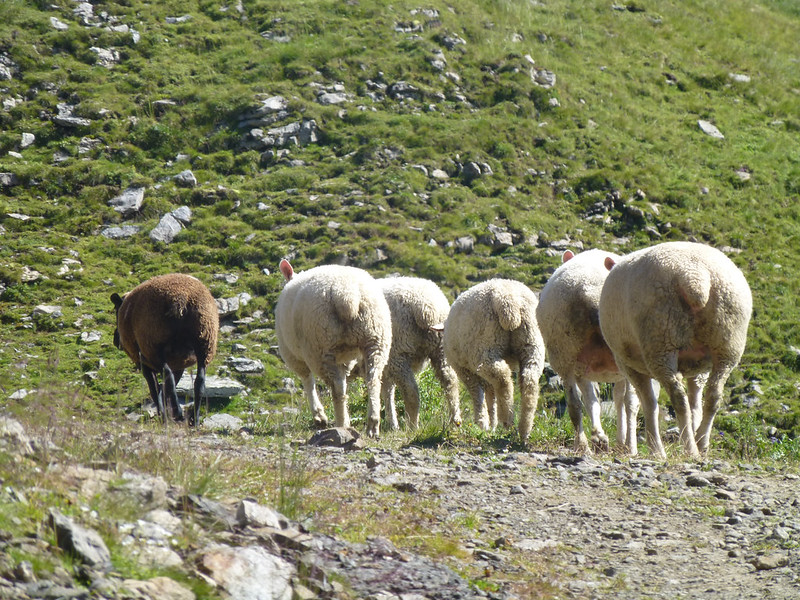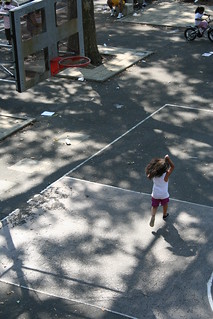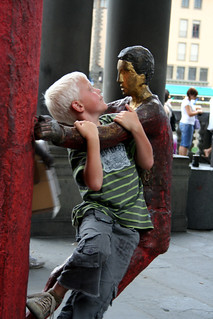Unconventional Interviews: Tips for Traveling With Foster & Adoptive Kids
This is part of my unconventional interview series, designed to demonstrate the wildly varied ways we can live, work, and chase our dreams. Please keep in mind that, since these are interviews, the opinions, methods, and websites contained within do not necessarily reflect my own views or experiences. (Which is, in my opinion, part of what makes them wonderful.)
Also note that none of the images in this post are of my friend or her actual family, for privacy’s sake.
Today, I am so pleased to introduce you to one of my friends: a foster mother who travels extensively with her family. She’s agreed to answer questions about traveling not just with kids, but with kids with difficult backgrounds and special needs.
First, tell us about you, your family, and your travels.
Hi everyone! My husband and I are in our early 30s and we live, work, and play in beautiful Northern Arizona (where we are lucky to have Gigi for a few months!).
When I was little, my parents were very insistent about all of their kids trying new things and seeing new places. Sometimes that meant camping (usually in the rain) near our home in Washington, sometimes it meant trips across the country by train or plane to see family. As we kids got older, it included more difficult backpacking, biking, and skiing trips and then international travel and things like scuba diving and riding camels.
My husband and I have loved traveling together almost from day one. We went all over the USA while we dating and dashed off to Australia as soon as we were married. Through the generous invitations of friends living abroad, we have been to Europe, Asia, and South America in the past three years.
How long have you been a foster mom? How many trips have you and your family taken now and to where?
We started taking foster parenting classes a little over a year ago. Four months later, we had our license and, less than two weeks after that, our nine-year-old son landed in our lives. The whole process was much faster than we expected it to be.
In the last eight months, in addition to running all over our home state of Arizona, we have been to Colorado, Utah, California, Florida, Mexico, and Bolivia as a party of three!
What do you love about travel? What makes it such an important part of your life?
I think humans are made to explore. That can mean hiking in the woods near your own house or sailing off to another country or flying to the moon, but we all need adventure.
We focus most of our travel on adventures and exploration in the wilderness…it’s addicting once you start! It never ceases to amaze me how much natural beauty there is in our world–and how dangerous and fragile it is at the same time. We have had so many great adventures with so many different people. It somehow always feels easy to form new friendships in the great outdoors.
Do you think travel is important for kids, and particularly traumatized kids? What do you think the benefits are?
A quick disclaimer: These are really complex topics, and I am not an expert in this stuff. These are just my opinions, and I’m ok with people doing their own research on trauma/travel/psychology/whatever and arriving at different conclusions.
First, regarding most kids with relatively “normal” upbringing in the US: they have way too much manufactured crap and not enough real experiences. Kids do not need more cheap plastic toys or mind-numbing electronic entertainment. They need to dig in mud and climb rocks and trees. They need to try unusual foods and have nonsense conversations with other kids who don’t speak their language. Kids have a natural inclination to play and learn…if only we adults can bring ourselves to let them explore their world away from the video game console and the antibacterial wipes.
Scientific studies have been telling us this for years: experiences –not things–bring us happiness and bond us to each other. Travel is a platform for getting kids (and adults) to push their limits, expand their comfort zones, and build closer relationships with their fellow human beings.
For kids who have survived extensive trauma, the adventure of travel (particularly in the outdoors in physically challenging environments) can be very healing. Most of these kids desperately need to connect with their physical world, find a sense of control over their own minds and bodies, and form healthy bonds with other people.
Again, I know this is an over-simplification of an extremely complicated topic, but I encourage anyone who is interested to look up “adventure therapy for trauma/PTSD” and similar topics. It is fascinating stuff. Here’s one amazing organization that has been putting these principals into action for years (and which I personally support).

What have been some of the greatest joys of traveling with your foster kid?
We have a unique situation in getting to have a lot of firsts with a nine-year-old who had never left the town he was born in before we met him. It’s fun to be reminded how amazing travel is through the commentary of an enthusiastic kid: everything from airplane turbulence to border crossings to different traffic laws is exciting and interesting to him. I think we adults who have been traveling our whole lives tend to forget that it IS really cool that we can jet across the world in mere hours AND watch movies on the plane AND eat dinner in the air AND they bring us our luggage at the end (usually)!
What have been some of the biggest challenges?
Like many foster kids, our son has some seriously dark stuff in his past that he has to deal with on a daily basis. On occasion, this results in seemingly disproportionate reactions to fear or anger. I know every parent has had to deal with tantrums, but PTSD-related breakdowns and flashbacks are a whole different beast.
In a tall and strong kid who knows a lot of swear words, it can get nasty pretty fast–and some embarrassing stuff has gone down in some pretty public places. We have had to spend some time with police officers and emergency room staff more than once. In hindsight it’s funny; in the moment, not so much.
But these challenges are getting fewer and farther between. Our son is facing life very bravely, fighting hard to heal and be part of a healthy family. We try to give him a lot of credit for that, even when we’re frustrated.
Are there any places you wouldn’t travel with a kid with a trauma background?
This is probably very kid-specific. We took about six months to get to know our son before we took him on his first plane flight. His previous caregivers thought he was scared of planes, but he wasn’t. He was deathly scared of open water (and we’re still not sure why), so something like a snorkel trip would have been a huge failure.
In talking with my other foster mom friends, I think we’d all agree that sensory-overload-prone places (looking at you, Disneyland) are the most challenging with traumatized kids, who tend to be hyper-vigilant and anxious even in calm settings. Again, I know I’m making sweeping generalizations here. The best you can do is get to know your kid, make the most well-informed call you can make at any given time, and don’t be too hard on yourself (or the kid) when you get it wrong.
Any places that jump out at you as being particularly good/friendly for foster and traumatized kids?
I can’t emphasize this enough: get these kids outside. Preferably out to some real wilderness where there are not very many people. And the more days and nights spent out there, the better.
What tips do you have for foster parents, adoptive parents, and parents of traumatized children when it comes to travel?
If you’re thinking of traveling with a kid who is in state care, don’t be dissuaded by the amount of red tape you have to go through. These kids need travel experiences, too!
Start your paperwork the instant you think you might want to take a trip. Call the airline and ask what they require. Sometimes all you need is a letter of permission from your state and/or a birth certificate. Sometimes you need a passport and vaccination records and a host of other random items.
We asked our judge for a passport the day our son came home (over six months before the time we would need it). By the time we had official permission, applied for the passport, and then applied for a visa, we got everything back 24 hours before our trip.
One of my favorite tips I’ve gotten so far for travel with a difficult kid is this: give only the really important things (like safety) Level One priority. These are the things you are willing to have a “knock-down, drag-out fight” with your kid over. Everything else is on either Level Two, which means you can be somewhat flexible on it, or Level Three, which means you don’t really care about it. For someone like me–super type-A control freak–this is a great way to compartmentalize what really matters while we’re traveling and give myself permission to not sweat the small stuff or get in fights with my son over things like whether he can have a second helping of gross street vendor food or how dirty is too dirty to skip a bath. Anyone about to lose an arm or die? No? Then we’re doing great!
Any good resources (books, websites) you recommend?
For a beautiful and very personal approach to international adoption and adoption from foster care, I recommend Jillian Lauren’s blog and her book Everything You Ever Wanted.
For an excellent academic read, try The Body Keeps the Score by Bessel van der Kolk.
How do you choose where to travel next?
We’ve been lucky; our last four major trips have happened because a local said “come visit” and we just took them up on the offer! We aim for outdoor destinations as much as we can, with some big-city touring sprinkled in between.
We do like arbitrary geographical markers, like going to the Four Corners or finding southern-most or northern-most tips of land masses. We realize this is pointless, but it’s fun. We have been to five continents and will probably try for seven because, what the heck, they’re there! I also think it would be fun to be able to say we’ve been to all 50 states.
What do you do to prepare before a trip?
Honestly, even though we tend to be very organized about other parts of life, we usually pack the night before our trips.
For our son’s first big trip, I was a little more proactive. I loaded up on Dramamine and Benadryl and Imodium and every other traveler-friendly drug known to man. I made our son a schedule with text and pictures of what we were doing each day. That seemed to help ease some of his anxiousness about the whole ordeal, plus–bonus!–every time I got the very repetitive “what are we doing next/tonight/tomorrow?!” I could say “check your schedule!”


What are the next trips on the horizon?
We are taking our son on his first advanced backpacking trip in the Grand Canyon in April. He has been asking to go for a while, and he’s finally getting strong enough!
Our next big trip will be a set of two road trips, camping and mountain biking our way across the American west and into Canada. This will take up about five weeks of our summer. We can’t wait!
Finally, Dear Readers: If you have any questions for me about our experiences with foster care/adoption or our experiences traveling with our kid, please leave them in the comment section. I’ll get back to you! Thanks!
Did this post help you? Share the love by:
:: Buying a copy of my unconventional travel guides (already have one? Gift another to a friend!)
:: Clicking here before you make your next Amazon order (it doesn’t matter what you order, if you start by clicking from my site, I’ll get a commission!)
Comments
-
-
Gina
I’ve seen a lot of travel guides/look how I do it posts/my travel life posts, but never ever one about traveling with foster or adopted children. Such an interesting perspective and so useful to parents out there wanting to continue their travel life even after growing their family. Thanks Gigi and thanks “foster mom”!
-
Germaine Kornegay
Its really hard to get permission to take a Native child out of state on vacation to visit family. Others in other tribes don’t have this issue. Outside of providing the complete agenda, what else can I do? Will she ever be able to travel like other kids?
-
Emily
Hi Germaine! Great question. You are not the only foster parent facing these sorts of issues. My understanding is that there can be many complexities involved in working with certain tribes as a foster parent, particularly if you are not part of that tribe. Learn as much as you can about the Indian Child Welfare Act (ICWA) if you plan to pursue long-term foster care or adoption of children that it will apply to. We have only fostered one child where ICWA applied, so I am no expert. The good news is that AFTER an adoption, your adopted child will have the same legal status/rights as any biological child of yours – so they will be able to travel without you needing to ask permission from any one else.
-
-
Wendy
Thank you for sharing! My husband and I have been fostering for 10 months. During this time we’ve had 3 placements. We traveled to Colorado with the second child in our care, a 3 year old boy. It was his first time in an airplane and he loved it. He was such a great traveler. We also did road trips with him and he really enjoyed the mountains (we live in NYC). We currently have two girls, sisters, in our care and we are planning trips abroad. The biggest hurdle is their birth mother who said no to a short road trip (agency overruled her). The girls have been in care for almost a year, have been placed in several homes before ours and we would love to give them the experience. The caseworkers already know our plans and are planning on easing mom into it. The girls show many more visible signs of the trauma they endured in their short lives, so I appreciate your insight in traveling. Thank you for sharing!

kristi
Oh wow, thanks for this! My husband and I have thought a lot about foster care/adoption and haven’t been sure how it might work with our love for travel. Very cool to hear about other families making it work!